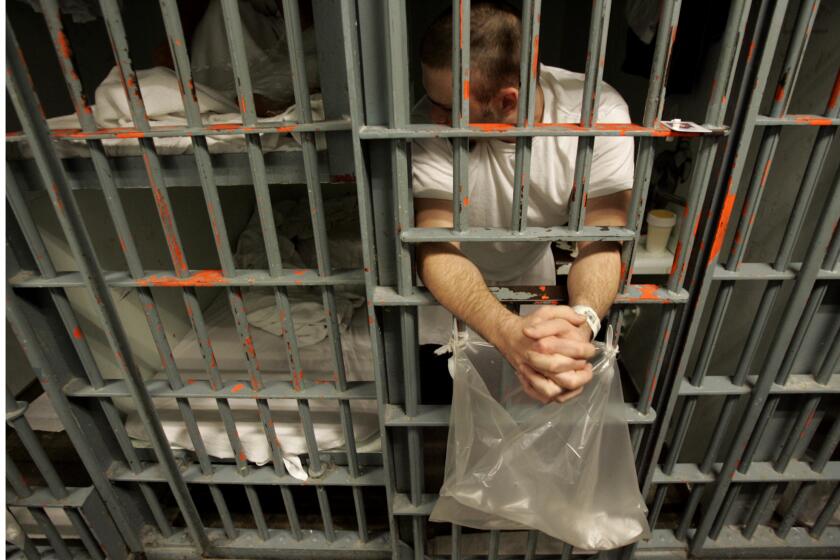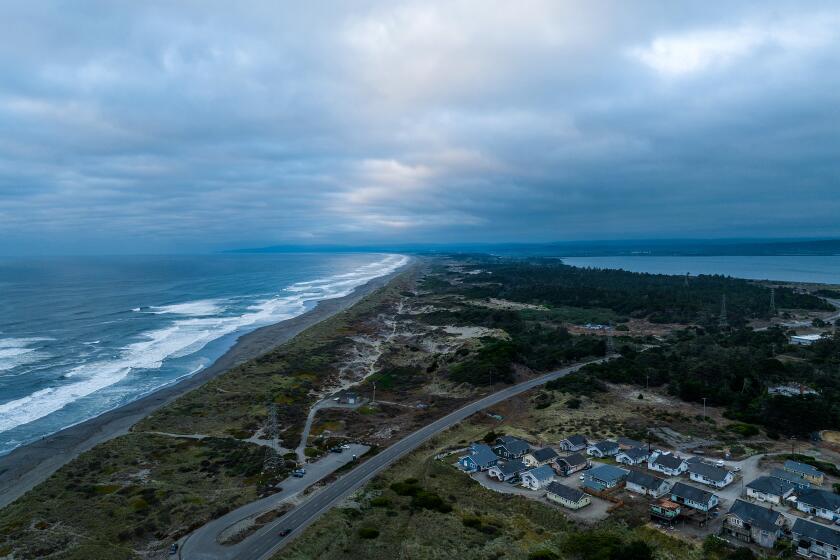It’s seen as one of L.A.’s most successful housing programs. A lawsuit seeks to strike it down

A nonprofit group focused on planning issues is seeking to strike down one of L.A.’s signature programs for building affordable housing and bringing taller, denser apartment buildings to the city’s public transit corridors.
Fix the City filed a lawsuit last week targeting the city’s Transit Oriented Communities program, which has loosened planning rules for real estate developers who have projects near rail stations and major bus stops.
In a broad-based legal assault, the group said the program, known as TOC, violates city and state laws and should have been approved by the City Council before going into effect.
Fix the City’s lawsuit seeks to overturn the city’s recent approval of a seven-story, 120-unit residential building on Santa Monica Boulevard just west of Century City that relied on the city’s looser planning rules.
Under that program, developers can go taller, include a greater number of housing units or receive other city incentives if at least a portion of their projects are kept affordable for lower income households. The project on Santa Monica is expected to reach 79 feet, instead of the 57 that would be allowed under existing rules, and offer less open space than otherwise permitted, according to the lawsuit.
The Transit Oriented Communities program was established as a result of Measure JJJ, which was approved by L.A. voters three years ago and billed as a way of addressing the city’s homelessness crisis and producing good construction jobs.
Laura Lake, a board member with Fix the City, said she voted for Measure JJJ when it was on the ballot in 2016. But she contends that city officials have not made good on the ballot measure’s promise of higher wages for construction workers.
Lake said city officials improperly used the program to rezone much of the city without securing legislative approval. They also provided developers with incentives, such as increased height, that go beyond what was authorized by the voters, she said.
“We’re challenging more than the one project at 10400 Santa Monica Blvd.,” Lake said. “We’re challenging a policy and practice that the city is using for all TOC projects. We want that halted and we want the planning department to start all over again with due process, public hearings and do what the voters approved.”
Elliot Nayssan, who is listed in planning documents as one of the people proposing the project on Santa Monica, did not respond to calls from The Times seeking comment. A spokesman for City Atty. Mike Feuer said the city’s lawyers will review the lawsuit and “have no further comment at this time.”
Laura Raymond, who heads one of the groups that championed Measure JJJ, referred to Fix the City as “notorious NIMBYs” who have sued over various development plans and transportation projects.
“The only thing they’ve succeeded in doing is stalling progress towards a more sustainable and equitable city,” said Raymond, director of the Alliance for Community Transit-Los Angeles.
The city’s TOC program has been touted as one of City Hall’s most successful initiatives for producing affordable housing. Since it was launched in late 2017, developers have proposed nearly 20,000 new homes, nearly 3,900 of which would be kept affordable for lower income households, according to the latest data from the planning department.
Earlier this year, Mayor Eric Garcetti described the program as “an incredible weapon” for addressing the city’s housing crisis and traffic problems. On Tuesday, Garcetti spokesman Alex Comisar offered additional praise, calling the program “lawful and essential.”
“The mayor believes this program is a critical tool for getting new affordable housing units built across the city,” he said in an email.
Fix the City has repeatedly sued the city over its handling of planning decisions. In 2013, the group was one of three organizations that succeeded in striking down the city’s Hollywood Community Plan Update, which called for taller, denser projects in Hollywood. Six years later, planning officials are still working on resubmitting the plan to the City Council.
Council members later agreed to pay $1.75 million to cover the legal bills of the groups that sued.
Fix the City was also one of three groups that persuaded a judge to strike down the city’s approval of a 27-story residential tower planned in Koreatown. But the group failed in its effort to have a court invalidate the city’s Mobility Plan, which was approved in 2015 and calls for hundreds of miles of bus and bicycle lanes.
That case was recently settled and the transportation plan remains intact.
More to Read
Sign up for Essential California
The most important California stories and recommendations in your inbox every morning.
You may occasionally receive promotional content from the Los Angeles Times.












